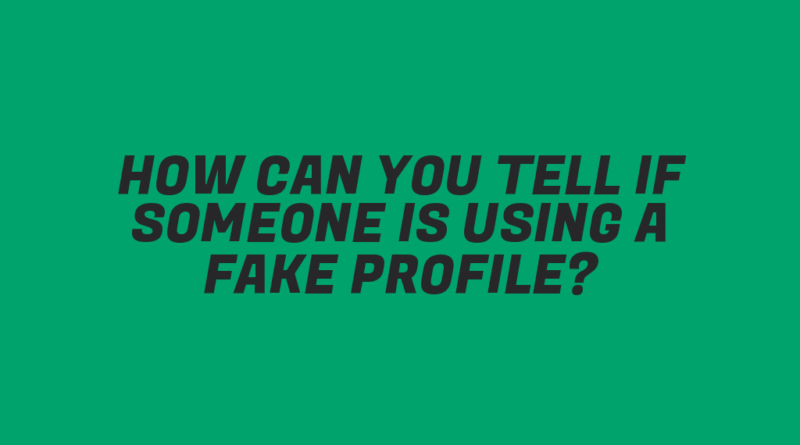How Can You Tell If Someone Is Using a Fake Profile?
Online dating offers endless possibilities for meeting new people, but it also comes with the risk of encountering fake profiles. These profiles are often created by scammers, bots, or individuals with dishonest intentions. Identifying a fake profile early can save you time and protect you from potential harm. In this article, we’ll explore the top 10 most common questions about spotting fake profiles and provide tips on how to recognize them.
What Are the Common Signs of a Fake Profile?
Fake profiles often exhibit specific signs that can raise red flags. Here are the most common indicators:
- Perfect Photos: If the photos look too perfect, like professional model shots, it could be a sign of a fake profile. Scammers often use stock images or photos stolen from other websites.
- Limited Information: Fake profiles usually have very little information in their bio or generic descriptions that lack personal details.
- Fast and Intense Communication: Scammers may try to move the conversation off the dating platform quickly or escalate the conversation to personal or romantic topics right away.
By being aware of these red flags, you can better identify fake profiles early on.
How Can You Verify Someone’s Photos?
One of the easiest ways to verify someone’s identity is by checking their photos. Here’s how to do it:
- Reverse Image Search: Use tools like Google Reverse Image Search or TinEye to see if the photo appears elsewhere on the internet. If the image is tied to a different name or website, it’s a clear sign of a fake profile.
- Ask for Additional Photos: If you’re unsure about someone’s identity, ask them to send more photos. A scammer may hesitate or provide excuses, while a genuine person will likely comply.
- Look for Consistency: Check if the person’s photos match their age, profession, and lifestyle as described in their profile.
By verifying someone’s photos, you can protect yourself from being misled by a fake profile.
Why Do Fake Profiles Often Have Vague Bios?
Vague or incomplete bios are a common sign of fake profiles. Here’s why:
- Lack of Personal Details: Fake profiles often avoid including personal information that could be easily fact-checked. Instead, they rely on generic phrases like “I love life” or “Looking for fun.”
- Copy-Paste Bios: Scammers frequently reuse the same bios across multiple profiles. If a bio feels generic or out of place, it could be a red flag.
- No Specific Interests or Hobbies: A genuine person will likely mention specific hobbies or interests, while a fake profile may avoid offering any real insight into their personality.
By paying attention to the content of someone’s bio, you can spot inconsistencies or signs of deception.
How Can You Detect Scammers Using Poor Grammar or Language?
Poor grammar and awkward language use are common traits of fake profiles. Here’s how to detect them:
- Language Mismatches: If the person claims to be from a certain country but uses language that doesn’t align with that region’s common speech patterns, this could be a sign of a scammer.
- Overly Formal or Robotic Language: Some scammers use scripts or automated responses, which can result in overly formal, repetitive, or robotic-sounding messages.
- Inconsistent English Proficiency: If the quality of the language suddenly shifts during a conversation, it could indicate that multiple people are operating the fake account.
Spotting these inconsistencies in language can help you determine whether the profile is genuine or fake.
Why Do Fake Profiles Often Move Conversations Off the Platform Quickly?
Fake profiles often try to move conversations off the dating platform as soon as possible. Here’s why:
- Avoid Detection: Scammers prefer to use unmonitored communication channels like WhatsApp or email, where they can’t be easily reported or flagged by the dating platform.
- Gain Personal Information: Moving the conversation to another platform allows scammers to ask for personal details, such as phone numbers or addresses, which can be used for identity theft or fraud.
- Pressure to Act Quickly: Scammers may push you to move off-platform to create a false sense of urgency or intimacy. This tactic is often used to manipulate you into taking quick actions, such as sending money or sharing sensitive information.
If someone insists on moving the conversation off-platform too soon, it’s a strong indicator that the profile may be fake.
How Can You Recognize Unrealistic or Suspicious Behavior?
Certain behaviors can reveal that you’re interacting with a fake profile. Here’s what to watch for:
- Too Good to Be True: If someone’s appearance, lifestyle, or promises seem too perfect or idealized, it’s worth questioning whether their profile is real.
- Quick Declarations of Love: Scammers often declare strong romantic feelings very early in the conversation to create an emotional bond, which can make it easier to manipulate their target.
- Inconsistent Stories: If the person’s story changes or doesn’t match the details in their profile, it’s a red flag that they may be lying.
Being aware of these behavioral patterns can help you avoid getting caught in a scam.
Why Do Fake Profiles Often Ask for Money or Personal Information?
One of the biggest giveaways of a fake profile is when the person asks for money or personal details. Here’s why scammers do this:
- Financial Scams: Scammers often create fake profiles to con people into sending money. They may fabricate emergencies, claim to need help with travel, or ask for gifts.
- Identity Theft: By asking for personal details like your address, social security number, or financial information, scammers can commit identity theft.
- Phishing Attempts: Scammers might ask for personal details under the guise of “getting to know you better” but use this information for malicious purposes.
If someone you’ve just met online asks for money or personal details, it’s almost always a scam.
How Can You Identify Bots or Automated Profiles?
Bots are often used to create fake profiles and interact with multiple users at once. Here’s how to recognize them:
- Generic Responses: Bots often provide generic answers that don’t directly address the questions you’ve asked. If their replies feel robotic or disconnected, it may be a bot.
- Instant Replies: Bots tend to reply instantly, regardless of the time of day or the complexity of the message. A real person may take time to respond thoughtfully.
- Repetitive Phrases: If you notice repetitive language or the same phrases used across different parts of the conversation, it could be a bot-generated response.
Bots are often used for scams or phishing attempts, so recognizing them early can help protect your information.
What Are the Signs of a Stolen or Catfished Profile?
Catfishing occurs when someone uses someone else’s photos and information to create a fake profile. Here’s how to spot it:
- Inconsistent Details: If the photos and the bio don’t seem to match—such as someone claiming to be a doctor but posting pictures that don’t reflect that lifestyle—it could be a catfish.
- Unwillingness to Verify Identity: If someone avoids video calls, refuses to send new pictures, or hesitates to meet in person, it’s a red flag that they may be using someone else’s identity.
- Different Social Media Presence: Check if the person has a consistent presence on other social media platforms. If their profile pictures are used across multiple accounts under different names, it’s likely a fake.
By being aware of these signs, you can avoid falling victim to a catfish scam.
How Can You Safeguard Yourself from Fake Profiles?
Here’s how to protect yourself from interacting with fake profiles:
- Stay Skeptical: Be cautious when someone seems too perfect or overly eager. Always approach online dating with a healthy level of skepticism.
- Verify Before Engaging: Use reverse image searches and ask for video chats to confirm the person’s identity.
- Don’t Share Personal Information: Never share sensitive information, such as your financial details, address, or passwords, with someone you’ve just met online.
- Report Suspicious Activity: If you suspect someone is using a fake profile, report them to the dating platform immediately. Most platforms have tools for flagging suspicious accounts.
Taking these precautions can help you navigate online dating more safely and avoid falling victim to fake profiles.
Identifying and avoiding fake profiles is essential for a safe and successful online dating experience. By paying attention to common red flags, such as vague bios, unrealistic behavior, or requests for money, you can protect yourself from scams and deception. Use tools like reverse image searches, set clear boundaries, and trust your instincts when something doesn’t feel right. With these tips in mind, you’ll be better equipped to recognize fake profiles and focus on finding genuine connections.











